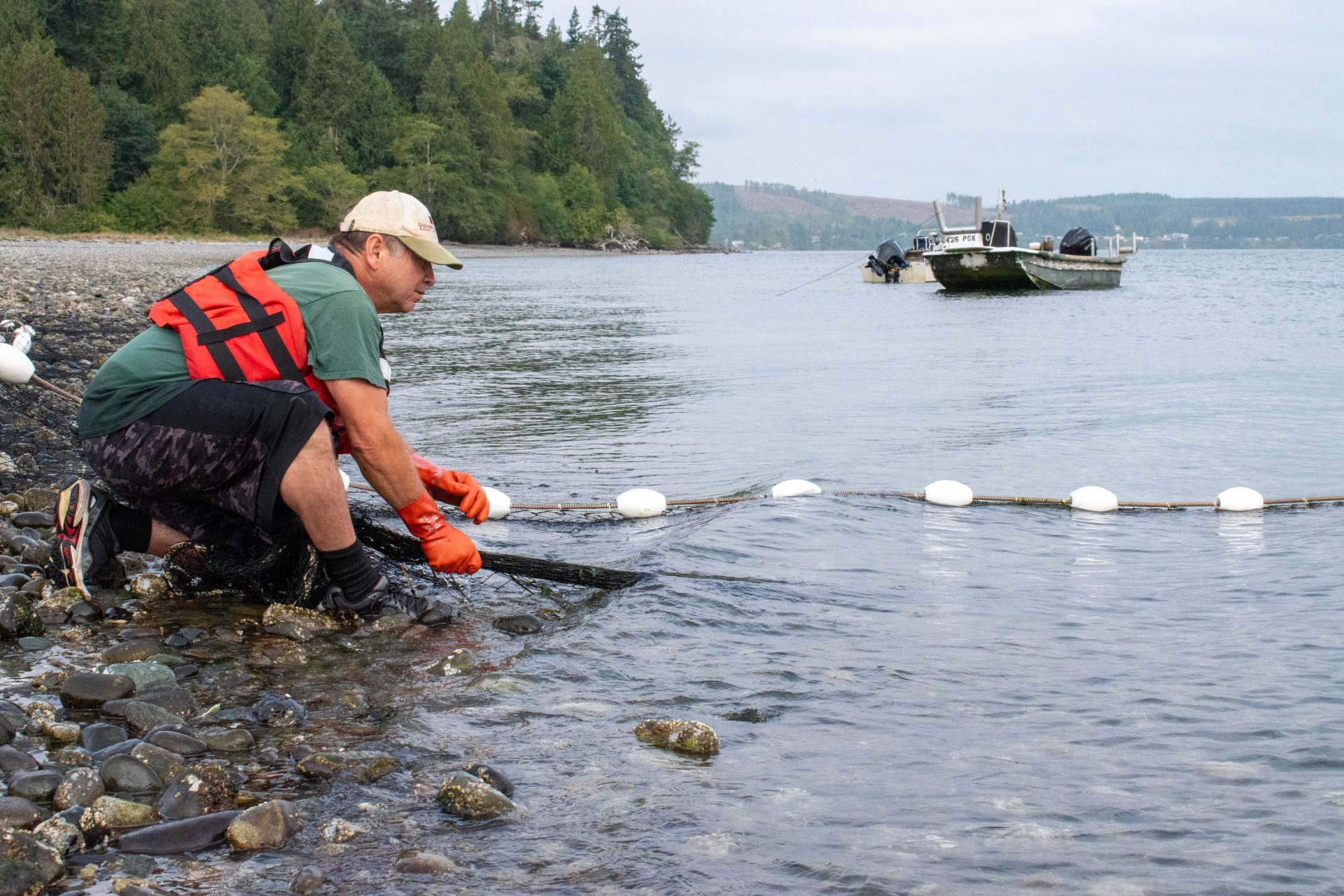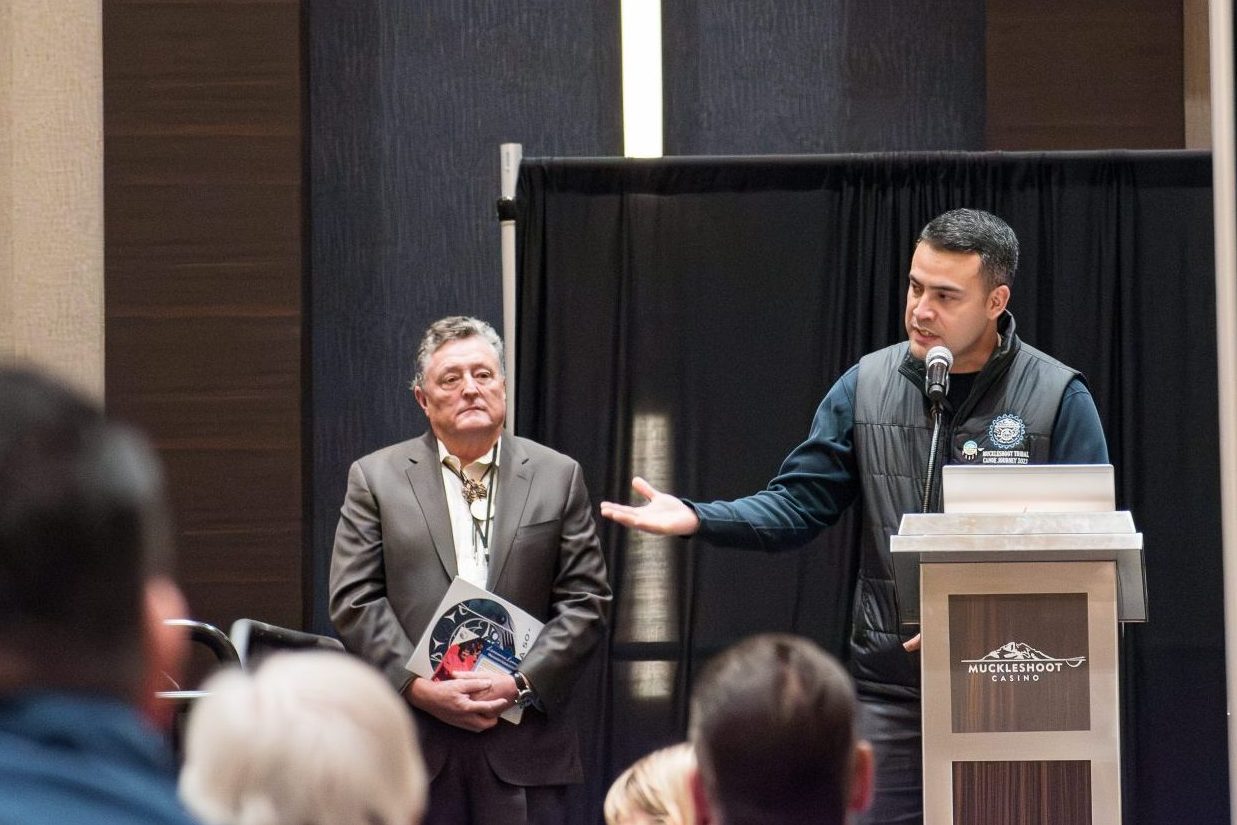For those interested, please find the FINAL WEEKLY LEG-COM NEWS for the 2007 State Legislative Session attached. Also attached is the FINAL PRIORITY BILLS LIST for this session. This is your wrap up edition, although Leg-Com News may be published occasionally during the interim as needs arise. Additional communications to this list may also be forthcoming, as budget issues get sorted out, new state laws are implemented, etc. We hope we have served you well during this session. And, as always, all comments are welcome. Thank you.
WRAP UP
The Washington StateLegislature wrapped up its 2007 session Sunday and the state’s lawmakers madetheir way home to various parts of the state for a well-deserved rest. Betweennow and the 2008 session, which will convene in January, there will likely beoccasional committee hearings and work sessions, a legislative week this summerand one in the fall. Rep. John McCoy, D-Tulalip, has scheduled a series ofmeetings on water, as depicted below, to which tribes and various stakeholdersare invited. The purpose of the meetings, according to McCoy, is to exploreoptions and potential solutions in water management, generally keying in onsuch issues as rural villages, rain barrels, relinquishment, and the municipalwater bill (1338, which tribes and environmental organizations are seeking tooverturn through the State Supreme Court). It is anticipated that there will beexpanded focus on water issues in the 2008 session, and, to some degree, themeetings are intended to help prepare for that session.
Note from Lacy Holmchick, Assistant toRepresentative John McCoy: “Rep. McCoy would like to invite you to participate in a discussion series on various issues dealing with Water. These meetings will take place monthlyat the Dept. of Labor & Industries bldg in Tukwila”
- Wednesday, May 9 at 2:30-4:00 p.m.
- Tuesday June 5th at 2:30-4:00pm
- Friday July 13th at 2:30-4:00pm
- Monday August 13th at 2:30-4:00pm
- Monday September 10th at 2:30-4:00pm
- Wednesday October 10th at 2:30-4:00pm
- Monday November 5th at 2:30-4:00pm
DURING THE INTERIM
During thenon-session months, tribes are advised to contact their state representativesto further inform and educate them about tribal perspectives, rights andprograms and ideally to seek enhanced coordination and cooperation with them innatural resource and environmental matters. In addition to improving relations,building alliances and increasing the capacity to influence state bills tocome, it is not a bad idea to consider the state legislature a mechanism forproactive efforts, e.g., to secure state funding and legislation to supporttribal efforts in environmental protection, salmon recovery, etc. As always,NWIFC asks to be kept “in the loop” with such efforts so we can help broadenthe united front and provide support services. For more information about yourlegislators, please contact
Steve Robinson,(360) 528-4347 or [email protected] or consult www.leg.wa.gov.
WHAT LIVED
Pleaseconsult the Priority Bills List for a more complete list of bills that survivedthe session. A complete list of all bills is provided on the legislative website (address above). Following are some of the priority naturalresource/environmental bills that survived the session and are either on theGovernor’s desk or already signed into law.
SB 5248, THE AG EXEMPTION BILL (View Bill as Passed Legislature)
Ultimately, the only natural resource bill opposed by tribesthat passed is SB 5248, the Agricultural Lands bill. Tribal response has beenthat this is bad news for the environment, particularly in view of majoragricultural impacts on water quality and the apparent disregard for endangeredspecies in passing this legislation. NWIFC and the tribes urged legislators tooppose the bill, saying that there is no justification for exemptingagriculture from CAO’s or buffers, particularly withESA-listed salmon in our waters. The version of the bill that did pass gave a4.5 year exemption to the agriculture industry and sent the issue forresolution to the Ruckelshaus Center. The Ruckelshaus Center advocates collaborative problemsolving as oppose to regulation. The agriculture community, which made manyoutlandish claims during session, such as saying it has negligible impact onsalmon, passionately rejected any form of regulation, and is already receivinginequitable regulatory passes. Early in session, legislators huddled withagriculture and environmental organizations, e.g., The Farm Bureau along with Futurewise, Audubon, etc., to negotiate the provisions ofthe bill. Tribes were not invited to those meetings, and tribal input on thelegislation was essentially disregarded. The bill went from a one-yearexemption from new regulations at the beginning of session to the 4.5-yearexemption that passed. The bill, which has been characterized by legislators asa compromise, or a “time out” to determine what if any actions should be takento balance the needs of agriculture with the needs for a healthy environment,will likely be signed by the Governor, although veto letters are being sent toher from the tribes. The reasons given by the environmental community forcaving on this legislation were the need to preserve open land, and a deal thatwas apparently struck between them and the agriculture community during thefight against I-933. Tribes were not party to any agreements regarding anymoratorium or in any way concurred with any such exemption. Tribes haveconcurred that it’s preferable to have properly managed agriculture lands thanto open the door to more and more development, but they have also stated thatthis does not mean they in any way condone further pollution and habitatdegradation, or exemptions from federal or state regulation. Legislators weretold that passage of 5248 would be a major step backward in the protection of fishand wildlife resources and in state-tribal relations prior to their vote. Butthey passed the bill anyway. Assuming that the Governor does sign the bill,options now available to tribes appear to include participation in theRuckelshaus process or overturning SB 5248 through new legislation, federalaction or litigation.
SB 5372, THE
PUGET SOUNDPARTNERSHIP:
The bill establishing the Puget Sound Partnership passed andwill no doubt be signed by the Governor. This policy will was the subject of alot of “tweaking” during session, which is certainly to be expected, given thegreat significance and complexity of starting a new agency. Some debatecentered around the need for the agency to havevarying levels of accountability, “teeth” and independence from the Governor’sOffice. Debate also focused on funding levels for salmon restoration(inadequate) and for watershed/tribal participation, which was zeroed out fromthe Operating Budget. The new agency is being formed as a major part of theeffort to restore the environment of
Puget Sound,which has become greatly polluted through the years. Ironically, legislatorsreported that the reason the salmon recovery funding was not appropriated atthe request level of $100 million was because of the $100 million that wasgranted to the Washington Wildlife and Recreation Program, which funds stateand local parks, trails, fish and wildlife habitat and farmlandpreservation projects. Generally speaking, WWRP provides grants to protect
Washington’snatural places. To learn more about WWRP, click on: Washington Wildlife and Recreation Coalition’s website.
HB 1024, PBDE’S (Bill as Passed Legislature)
Despite heavy opposition from the chemical industry and some firefighter unions, the bill to phase out PBDE’s, aDepartment of Health request bill, has been signed into law. There wasextensive controversy about the actual impacts of PBDE’s on humans, fish, wildlife and the environment. But there was no controversyabout the incredible expansion of the chemicals, used to fire proof computers,televisions, clothes, furniture, rugs, etc. in the environment. Some firefighting entities found their way clear to support to the bill, realizing PBDE’s will only be phased out as suitable alternatives aredeveloped. The bill makes Washington the first state to start phasing out fire-retarding chemicals used in consumerproducts. The sale and manufacture of products containing the chemicals, knownas PDBEs, or polybrominated diphenyl ethers, is prohibited if safer alternatives are available.
SB 5923, AQUATIC INVASIVE SPECIES/BALLAST WATER: (View Bill as Passed Legislature)
Supporting the effort to remedy the appalling aquaticinvasive problem in Washington waters, tribes supported passage of this bill, and its predecessors. Theimportance of controlling these challenges goes without question, and yet it has been common for ships to take on ballast from waters from around the worldand dump them into our waters, with inadequate. The result has all too oftenbeen the introduction of plant and animal species that can take over the marinehabitats of our region.
SB 6117, RECLAIMED WATER: (View Bill as Passed Legislature)
The Reclaimed Water Bill passed and has been sent to theGovernor. NWIFC maintained a “no consensus” position on this bill due todiffering perspectives among member tribes. Ultimately, much of the bill wasrelegated to “study” status and is to include tribes. The general intent of thebill is to encourage the use of reclaimed water for various uses such as golfcourse irrigation. One of the most controversial considerations related to thislegislation during session pertained to use to augment streams. The study taskforce is to be convened by the Department of Ecology and a report is due to thelegislature by December 31, 2007.
HB 1646, FISH SAMPLING, (View Bill as Passed Legislature)
This bill, which has been sent to the Governor, supports theability of state agents to take various samples from harvested salmon, etc., toaid investigations related to poaching, etc. A request to clarify that tribalharvesters are exempt from such inspections by state agents did not make thefinal cut. Achieving exemption language, in an effort to clarify enforcement inthe field, proved to be illusive in other bills as well. Nonetheless, tribalharvesters operating under tribal regulations are exempt from stateprosecution—whether it’s clarified in state law or not.
SB 6001, LIMITED GREENHOUSE GAS EMISSIONS (View Bill as Passed Legislature)
This Climate Change-related bill limits greenhouse-gasemissions from new power plants and bars utilities from entering new long-termpower contracts with coal-fired power plants.
HB 2220 —SHELLFISH AQUACULTURE (View Bill as Passed Legislature)
Tribes worked in concert with the shellfish growers’industry on this bill throughout session. The ultimate result—after survivingextensive efforts by some legislators to cater to “Nimbies”whose primary interest was aesthetic (but posed as environmental)—was passageof a mutually acceptable bill.
FUNDING
The Operating, Capitol and Transportation budgets are stillunder review, and some detailed information will be distributed as implicationsclarify. However, the final budgets are available at the links on the PriorityBills List, and PDF copies of the natural resources sections are beingdistributed to tribes Lawmakersapproved a big $33.4 billion two-year operating budget that uses a large shareof the state’s $2.2 billion tax windfall to plow more than $1 billion intoschools, expand college enrollment by 9,700 students, cover 39,000 more kids inhealth care, and begin the $8 billion task of cleaning up Puget Soundpollution.
WWRP
The Capital Budget included a record $100 million forWashington Wildlife Recreation Program projects. WWRP, which has included someminimal tribal participation, funds habitat restoration programs and purchasesof lands with prime habitat, with a bent toward the provision of recreationopportunities and farmland preservation. During session NWIFC was informed bysome legislators that this $100 million item cut into
salmon restoration funding.
PILOT TRIBAL WATER PROJECT
This is an effort that has been on the mid-burner for several years. Itinvolves a government-to-government-to-government (tribal/state/federal) mediation process that is voluntary to participating tribes, NEPA-like and analternative to water adjudication. Current participating tribes includeQuinault and Tulalip. The Institute for Environmental Conflict Resolution is afederal agency being contracted with to do the mediation and the Department ofEcology and participating tribes are at the table. It became evident that anextension of $150,000 appropriated by the 2006 State Legislature was needed,however. As it currently appears, $200,000 in new funding has been appropriatedin the Operating Budget now on the Governor’s desk.
OIL SPILLPREVENTION AND RESPONSE
A deal was struck between the two houses and the Governorregarding oil spill funding. Even though the Oil Spill Advisory Committee andthe Ocean Policy Work Group recommended that the state step up to provide itsshare of funding for a year around tug at Neah Bay,the heads of the two houses and the Governor determined not to take a (barrel)”tax vote” this year. The Governor, who has focused heavilyon federal funding for this purpose. She’s convinced that SenatorCantwell’s S 2440, which would fund the construction of an enhanced tug, willpass and thus she was inclined to only provide piecemeal funding for the nextfew years. A part time tug will be funded for 2008 and a full time tug for 2009through the supplemental budget. If the federal government has not taken actionby that time, other funding sources will be discussed. The OSAC will be fundedat the existing level for the biennium (+ $200,000 for studies), even thoughthe Governor had leaned toward sunsetting it earlierthis session. Shortfalls in funds for oil spill work at DOE may be a problem.There will be a JLARC review of that in the interim. Tribal testimony hasemphasized the critical nature of the oil spill danger and pushed for statesupport of Cantwell’s bill.
A FEW OF THE BILLS THAT FAILED
Generally speaking, there was a positive relationshipbetween tribes/NWIFC and legislators this session. There was a stronginclination on the part of lawmakers to listen to tribal input, and a number ofunfavorable bills went by the wayside as a result. Some of these include:
SB5733, HPA PERMITS AND PREVENTION OF FLOOD DAMAGE
This bill, which tribes consistently opposed, was intendedto force the Department of Fish and Wildlife to issue hydraulic permits, at thedirection of counties that determine there has been chronic damage (2 years) toproperty by flooding. Initially, such permits were to be exempt from SEPA andthe agency was to consider private property on an equal basis with fish.Several of these concerns were alleviated by amendments, but the emphasis oncounty authorities remained.
HB 1727, GROWTH MANAGEMENT—RURAL VILLAGES
Rural Villages, backed by the Cascade Land Conservancy, cameinto the legislature, apparently on a greased skid toward passage. The troublewas that tribes had never been consulted. Meetings early in session resulted ina tribal position that never wavered—that a study on urban sprawl would beokay, as long as it involved tribes and as long as it did not focus exclusivelyon urban villages, but rather on the broader topic of solutions to urbansprawl. Urban villages, essentially satellite communities in somewhat isolatedareas, were held up as a great alternative to carte blanche sprawl. Tribesdidn’t buy it, feeling that these villages are harmful to the environment inmany ways and that no such process is legitimate without full tribalparticipation. The first bill was killed, but the concept resurrected in HB1727, and realtors/builders commenced a major television advertising campaignto support it. Their effort failed.
HB 1453/SB 5519, POINTS OF WATER DIVERSION BILL
This legislation proposed to exempt water users who changethe point source of their water, within the same “pool” of water. Tribesopposed it, saying it would result in larger takes of water, particularlyinchoate water—and it failed to pass.
HB 1748/SB 5733, HPA PERMITS AND PREVENTION OF FLOOD DAMAGE
This legislation would have directed counties to identifychronic flood-damaged properties (chronic being defined as two years) and enablethe counties to order the WDFW to issue an HPA permit to correct the situation.Trouble was, fixing the situation could have entailedgravel mining, bank hardening or other efforts that would affect fish andwildlife habitat. Tribes opposed the bills throughout session and they failed.
SB 6011, CREATING THE MAURY ISLANDRESERVE
This bill was largely intended to permit expanded gravelmining on Maury Island,which is in Puyallup tribal U&A. As a last ditch effort to salvage the bill, it was engrossed tothe Puget Sound Partnership bill, and hotly debated on the floor, but it failed.
HB 1076, ROCKFISH RESEARCH
This would have supported rockfish research and stock assessment. Tribal testimony supported the concept and asked for tribes to be included, but the legislation failed.
SB 5129, UNLAWFULLY HUNTING UPON THE PROPERTY OF ANOTHER
This bill, which also failed, addressed a problem manylandowners have when hunters go onto their property to hunt or retrieve game.From the tribal perspective the bill was okay, except it needed to clarify thefact that such laws do not apply to tribal hunters. Neither the bill sponsornor WDFW were willing to concede that point—which might be indicative of evenlarger problems.
HB 1193, GOVERNOR APPOINT FISH AND WILDLIFE DIRECTOR
There was not a consensus on this bill, so NWIFC remained neutral on it, but it died from lack of momentum.




